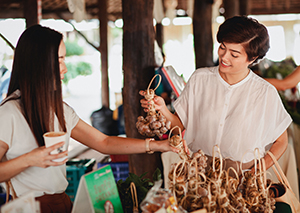Inflammation, an immune-mediated reaction, is how your body defends itself against potential harm. Redness, swelling, or fever are all typical, healthy examples of acute inflammation. If you are hurt or sick, acute inflammation sends a message to promote healing and repair. It usually only lasts a few days, and soon the body can relax into a normal state of equilibrium.i ii
But what happens when the inflammatory process doesn’t turn off? With inflammation, altered immune signaling pathways continue to produce inflammatory messengers for months or years. The result is a revved-up immune system that throws your body out of balance.
Over time, inflammation response can add up and contribute to significant health concerns, but the good news is that you can take steps to limit the impact on your body. Herbal extracts are one simple but potent way to help your body with the healthy inflammation support.

What contributes to inflammation?
Many of the risk factors associated with inflammation connect to your lifestyle, including weight, diet, stress, and sleep. As you age, your body’s production of inflammatory molecules naturally increases. These increases may be related to the accumulation of free radicals over time, reduced efficiency of your mitochondria (the energy producers of your cell), and a decrease in protective hormones like estrogen.iii
Extra body weight can also contribute as fat tissue secretes its own pro-inflammatory cells iv along with a diet high in refined sugar or unhealthy fats. Put all together, these daily exposures can further oxidative stress and inflammation in your body.
Musculoskeletal or gastrointestinal inflammation is tricky because while some do experience symptoms like discomfort, fatigue, or digestive concerns, many people aren’t even aware until it becomes a bigger problem. Numerous health concerns are attributable or worsened by chronic inflammation and oxidative damage.v
This is why there is such an emphasis on anti-inflammatory diets to reduce these daily insults by including foods known to support a healthy inflammatory response and antioxidant activity.vi
But beyond the food you eat, there are a few extra special spices and herbs that provide strong support for inflammation.
Botanical extracts for inflammation support
Turmeric (Curcuma longa)
The curry from your favourite Indian food restaurant gets its rich, yellow colour from this powerful spice. Used in Ayurvedic cooking and traditional Chinese medicine, turmeric maintains a healthy inflammation response and provides antioxidant properties. In research, many of the health benefits attributed to turmeric are due to a compound found in turmeric called curcumin.
Curcumin has been well-studied for its interaction with inflammatory molecules and antioxidant influence in your body.vii It may support reductions in oxidative stress and inflammation through its ability to interrupt pro-inflammatory signals. It also may help to balance free radical damage by supporting antioxidant activity.vii
Many studies have linked curcumin supplementation with joint inflammation support.viii Occasional joint discomfort is a sign of inflammation, so this may be why curcumin appears so supportive for improvements with occasional joint discomfort.vi ix It also can help with reductions in markers of inflammation associated with certain health conditions.x xi
As turmeric interest has grown over the past few years, recipes for golden milk (a warm drink made by mixing dairy or plant-based milk, turmeric, and other spices), soups, and curries are increasingly popular. Including a few turmeric-rich recipes a few days a week can be a delicious way to get more into your diet.
At the same time, supplementation can also bump up your intake. It’s important to note that turmeric absorption is improved with the consumption of fat and black pepper. Many supplements have been designed with this in mind to support optimal absorption.
Ginseng (Panex Ginseng)
Panex Ginseng (also known as Asian Ginseng) is a special botanical because of the many ways it supports your body. There are multiple types of ginseng, but Panex Ginseng is the most commonly used and researched.xii It’s often used to promote vitality and to support the body during periods of occasional stress.xiii
Ginseng may support inflammation in the body through its effects on your stress response. It’s categorised as an adaptogen, meaning it supports a healthy stress response in the body. Stress can be a significant contributor to inflammation due to the upregulation of stress hormones, but ginseng may help calm the adrenal response, reducing the impact of stress hormones on your body.xiv
Ginseng may also play a role in supporting the release of inflammatory cytokines as part of a healthy immune response.xv A small study conducted on college students also found that ginseng supplementation improved inflammatory markers post-exercise and supported improvements in blood sugar response.xvi

While you can find recipes for ginseng in soups or teas, it has a bitter taste, so it is more commonly used in tonics or supplements.
Indian Frankincense (Boswellia Serrata)
While this herb isn’t likely to be found in the everyday kitchen, it has a long, ancient history in Ayurvedic medicine. Boswellia is a resin from the Boswellia serrata tree. It can be taken as a supplement, tincture, or used as an oil to promote healthy joints, connective tissue and colon function by supporting healthy inflammation response.xvii
The acids in Boswellia have been studied for their effect on the inhibition of inflammatory signalling molecules, especially those associated with pain and free radical damage.xvii While more recent studies on humans are needed, research does suggest that the acids in Boswellia appear to disrupt a specific pro-inflammatory enzyme that provides support for mobility and occasional joint discomfort.xviii It may even positively impact recovery for those with neurological conditions by supporting a reduction in inflammatory markers.xix
Interestingly, a significant contributor to oxidative stress is overexercising. Daily physical movement is an essential part of a healthy lifestyle, but overdoing it can increase free radical damage and inflammation in your body. A study examining athletes who took a combination supplement of Boswellia and curcumin found that following a Mediterranean diet pattern improved several markers of inflammation in all athletes, but those that also took the supplement saw even more improvements.xx
Boswellia likely isn’t something you would add to a weeknight meal, but it is easy to find in supplemental form.

Takeaway
The more we learn about inflammation and the body, the more obvious it becomes that taking daily measures to support reduction is not only essential but a simple way to empower yourself on your health journey. It’s always helpful to discuss supplements with your healthcare practitioner. Still, a significant benefit of these herbs is that they are gentle yet effective without unwanted side effects.
While you can’t stop the natural progression of aging, you can make lifestyle choices that reduce the inflammatory burden in the body. In combination with healthy habits, especially anti-inflammatory foods, these botanicals can be a powerful tool to support a healthy inflammatory response.
i Furman, David, Judith Campisi, Eric Verdin, Pedro Carrera-Bastos, Sasha Targ, Claudio Franceschi, Luigi Ferrucci, et al. Nature Medicine 25, no. 12 (December 2019): 1822–32. https://doi.org/10.1038/s41591-019-0675-0.
ii Pahwa, Roma, Amandeep Goyal, Pankaj Bansal, and Ishwarlal Jialal. In StatPearls. Treasure Island (FL): StatPearls Publishing, 2021. http://www.ncbi.nlm.nih.gov/books/NBK493173/.
iii Villa, Alessandro, Nicoletta Rizzi, Elisabetta Vegeto, Paolo Ciana, and Adriana Maggi. “Estrogen Accelerates the Resolution of Inflammation in Macrophagic Cells.” Scientific Reports 5, no. 1 (October 19, 2015): 15224. https://doi.org/10.1038/srep15224.
iv Makki, Kassem, Philippe Froguel, and Isabelle Wolowczuk. “Adipose Tissue in Obesity-Related Inflammation and Insulin Resistance: Cells, Cytokines, and Chemokines.” ISRN Inflammation 2013 (December 22, 2013). https://doi.org/10.1155/2013/139239.
v Hunter, Philip. “The Inflammation Theory of Disease.” EMBO Reports 13, no. 11 (November 2012): 968–70. https://doi.org/10.1038/embor.2012.142.
vi Minihane, Anne M., Sophie Vinoy, Wendy R. Russell, Athanasia Baka, Helen M. Roche, Kieran M. Tuohy, Jessica L. Teeling, et al. “Low-Grade Inflammation, Diet Composition and Health: Current Research Evidence and Its Translation.” The British Journal of Nutrition 114, no. 7 (October 14, 2015): 999–1012. https://doi.org/10.1017/S0007114515002093.
vii He, Yan, Yuan Yue, Xi Zheng, Kun Zhang, Shaohua Chen, and Zhiyun Du. Molecules 20, no. 5 (May 2015): 9183–9213. https://doi.org/10.3390/molecules20059183.
viii Paultre, Kristopher, William Cade, Daniel Hernandez, John Reynolds, Dylan Greif, and Thomas Michael Best. BMJ Open Sport & Exercise Medicine 7, no. 1 (January 1, 2021): e000935. https://doi.org/10.1136/bmjsem-2020-000935.
ix Amalraj, Augustine, Karthik Varma, Joby Jacob, Chandradhara Divya, Ajaikumar B. Kunnumakkara, Sidney J. Stohs, and Sreeraj Gopi. Journal of Medicinal Food 20, no. 10 (October 2017): 1022–30. https://doi.org/10.1089/jmf.2017.3930.
x Khajehdehi, Parviz, Maryam Pakfetrat, Katayoun Javidnia, Fariborz Azad, Leila Malekmakan, Mahshid Hashemi Nasab, and Gholamreza Dehghanzadeh. Scandinavian Journal of Urology and Nephrology 45, no. 5 (November 2011): 365–70. https://doi.org/10.3109/00365599.2011.585622.
xi Khajehdehi, Parviz, Batol Zanjaninejad, Elham Aflaki, Mohamadali Nazarinia, Fariborz Azad, Leila Malekmakan, and Gholam-Reza Dehghanzadeh. Journal of Renal Nutrition: The Official Journal of the Council on Renal Nutrition of the National Kidney Foundation 22, no. 1 (January 2012): 50–57. https://doi.org/10.1053/j.jrn.2011.03.002.
xii Yun, T. K. “Brief Introduction of Panax Ginseng C.A. Meyer.” Journal of Korean Medical Science 16 Suppl (December 2001): S3-5. https://doi.org/10.3346/jkms.2001.16.S.S3.
xiii Panossian, Alexander G., Thomas Efferth, Alexander N. Shikov, Olga N. Pozharitskaya, Kenny Kuchta, Pulok K. Mukherjee, Subhadip Banerjee, et al. “Evolution of the Adaptogenic Concept from Traditional Use to Medical Systems: Pharmacology of Stress- and Aging-Related Diseases.” Medicinal Research Reviews 41, no. 1 (January 2021): 630–703. https://doi.org/10.1002/med.21743.
xiv Irfan, Muhammad, Yi-Seong Kwak, Chang-Kyun Han, Sun Hee Hyun, and Man Hee Rhee. “Adaptogenic Effects of Panax Ginseng on Modulation of Cardiovascular Functions.” Journal of Ginseng Research 44, no. 4 (July 2020): 538–43. https://doi.org/10.1016/j.jgr.2020.03.001.
xv Kang, Soowon, and Hyeyoung Min. “Ginseng, the ‘Immunity Boost’: The Effects of Panax Ginseng on Immune System.” Journal of Ginseng Research 36, no. 4 (October 2012): 354–68. https://doi.org/10.5142/jgr.2012.36.4.354.
xvi Jung, Hyun Lyung, Hye Eun Kwak, Sung Soo Kim, Young Chan Kim, Chong Do Lee, Heidi K. Byurn, and Ho Youl Kang. “Effects of Panax Ginseng Supplementation on Muscle Damage and Inflammation after Uphill Treadmill Running in Humans.” The American Journal of Chinese Medicine 39, no. 3 (2011): 441–50. https://doi.org/10.1142/S0192415X11008944.
xvii Siddiqui, M. Z. “Boswellia Serrata, A Potential Antiinflammatory Agent: An Overview.” Indian Journal of Pharmaceutical Sciences 73, no. 3 (2011): 255–61. https://doi.org/10.4103/0250-474X.93507.
xviii Vishal, Amar A., Artatrana Mishra, and Siba P. Raychaudhuri. International Journal of Medical Sciences 8, no. 7 (2011): 615–22. https://doi.org/10.7150/ijms.8.615.
xix Baram, Somayeh Mahmoodi, Saeed Karima, Somayeh Shateri, Abbas Tafakhori, Akbar Fotouhi, Behnam Safarpour Lima, Shima Rajaei, et al. Inflammopharmacology 27, no. 6 (December 2019): 1101–12. https://doi.org/10.1007/s10787-019-00627-z.
xx Chilelli, Nino Cristiano, Eugenio Ragazzi, Romina Valentini, Chiara Cosma, Stefania Ferraresso, Annunziata Lapolla, and Giovanni Sartore. “Curcumin and Boswellia Serrata Modulate the Glyco-Oxidative Status and Lipo-Oxidation in Master Athletes.” Nutrients 8, no. 11 (November 2016): 745. https://doi.org/10.3390/nu8110745.
Share:
Related Posts

Benefits of Creatine in Perimenopause and Menopause
Written by Maura MacDonald, MS, RD, CSSD | 2025 As we age, the notion is that we will inevitably become weaker. Not as mobile as

Goodbye Pie Chart, Hello Phase 1 Sliders
Written by Allison Smith, ND | 2025 As we usher in a new era of DUTCH testing which leaves behind the concept of the three-way

Introducing the DUTCH Dozen
Written by Kelly Ruef, ND | 2025 Hormone testing can be complex, which is why Precision Analytical developed the DUTCH Dozen, an interpretive framework that

DUTCH Report Enhancements
Written by Hilary Miller, ND | 2025 Precision Analytical have released the newest version of the DUTCH Test. This is the report’s most significant update

Gallbladder Health 101: What It Does and How to Keep It Working Well
Written by Ashley Palmer & Pooja Mahtani | 2025 The gallbladder may not get much attention compared to the gut, but it plays a central

